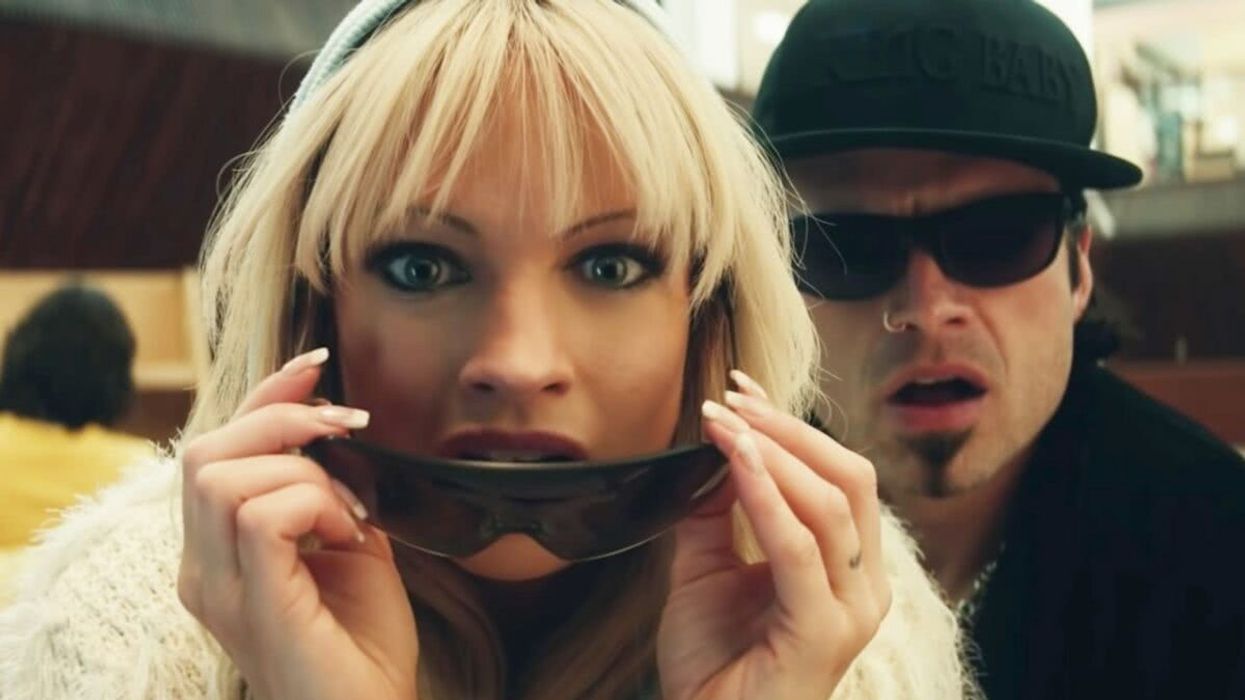This Is Why Pamela Anderson Refuses to Watch Hulu’s 'Pam & Tommy'
Do life rights hold any weight in modern Hollywood?

The limited Hulu series Pam & Tommy tells the true story behind the release of Pamela Anderson’s (Lily James) and her then-husband Tommy Lee’s (Sebastian Stan) stolen sex tape, and Anderson isn’t too happy about the show’s release.
A source close to Anderson told EW that she won’t be watching the show now or ever, saying, “I don’t know she’ll never, never watch this. Not even years from now. Not even the trailer.”
The showrunners and series star Lily James have previously stated they reached out to Anderson during the series’ development, but never received a response. The source confirms Anderson was contacted multiple times, first “years ago” way before filming took place and again during the series’ post-production, but Anderson wasn’t interested.
Tommy Lee, however, did talk to Sebastian Stan, and the source says, “Tommy doesn’t get it. He’s in the same mindset he was at the time: that any publicity is good publicity.”
Having a traumatic moment in one’s life turned into a television series for the enjoyment of the public once again can’t be fun, and you think a show about a person’s trauma would need their permission. Unfortunately, that is not the case.
While Pam & Tommy focuses on Anderson, the producers were able to develop the series without her participation or permission by optioning the rights to an article published by Rolling Stone in 2004, disregarding Anderson’s life rights. If you are a bit hazy on what life rights are, they are the rights to a person’s life story, and should have a provision in the agreement that grants exclusive rights to the story, as well as to any photographs, documents, or other media related to the story. A filmmaker or producer should be given the right to fictionalize or change any names of the characters at the person’s request.
Like many filmmakers who face backlash after using someone’s story without permission, a loophole known as public domain is used to tell the story from a “different” perspective.

While Lee was launched back into stardom from the infamous sex tape, Anderson was humiliated by media outlets and her career was derailed, making it harder for her to be taken seriously as an actress. Anderson and Lee sued to keep the tape from being released, but the opposing lawyers brought up Anderson’s Playboy spreads, asking why the couple would care about the tape if she had posed for Playboy multiple times.
Her public image, along with Lee’s manic-bad-boy persona, made it easy for people to believe that the tape had been leaked on purpose, claiming it was a publicity stunt, placing Anderson in a negative light. The new series covers every aspect of Anderson’s maligning.
The source says, “As a friend of Pamela, at least no one will ever ask me again if the tape was really stolen. But imagine if a celebrity today had their nudes leaked and then Hollywood recreated not just the crime, but the actual nudes—that would never happen. In the ‘90s, Pamela’s body was deemed by a judge to be public property. There was no question the tape was stolen property, but the court decided it wasn’t private property because her body belonged to the world.”

The source adds that after the #MeToo movement, “Pamela is somehow still the exception to the rule. She’s still up for grabs. That’s messed up. Yes, it’s brief clips, but to me, the most damning aspect is that [Pam & Tommy] didn’t just tell the story, they recreated moments from the boat.”
The show gave Pamela a voice she didn’t ask for, nor one she wanted. The source believes that the series didn’t always capture the true Anderson, saying, “Pamela is not that meek. She is not a shrinking violet and never was.”
This isn’t the first time producers for a show or film didn’t get permission to use someone’s life for the sake of entertainment. Ridley Scott’sHouse of Guccidid not consult the heirs before describing the murder of Maurizio Gucci. The family’s statement said, “The production of the film did not bother to consult the heirs before describing Aldo Gucci… and [describing] the members of the Gucci family as thugs, ignorant and insensitive to the world around them.”

For anyone, it would be extremely painful to see yourself and a traumatic situation you encountered taken into the hands of someone you’ve never met and then put on display for entertainment. Some, like director Ridley Scott, believe that once your story is out in the world, it becomes part of the public domain and is up for grabs.
I think creating a show from a person's extremely personal and traumatic experience without their permission is problematic. Pam & Tommy only shows the fault in a culture that shamed women for their sexuality and refused to give empathy to those whose privacy was violated for the sake of entertainment.
Let us know what you think of the loophole around life rights in the comments.
Source: EW











